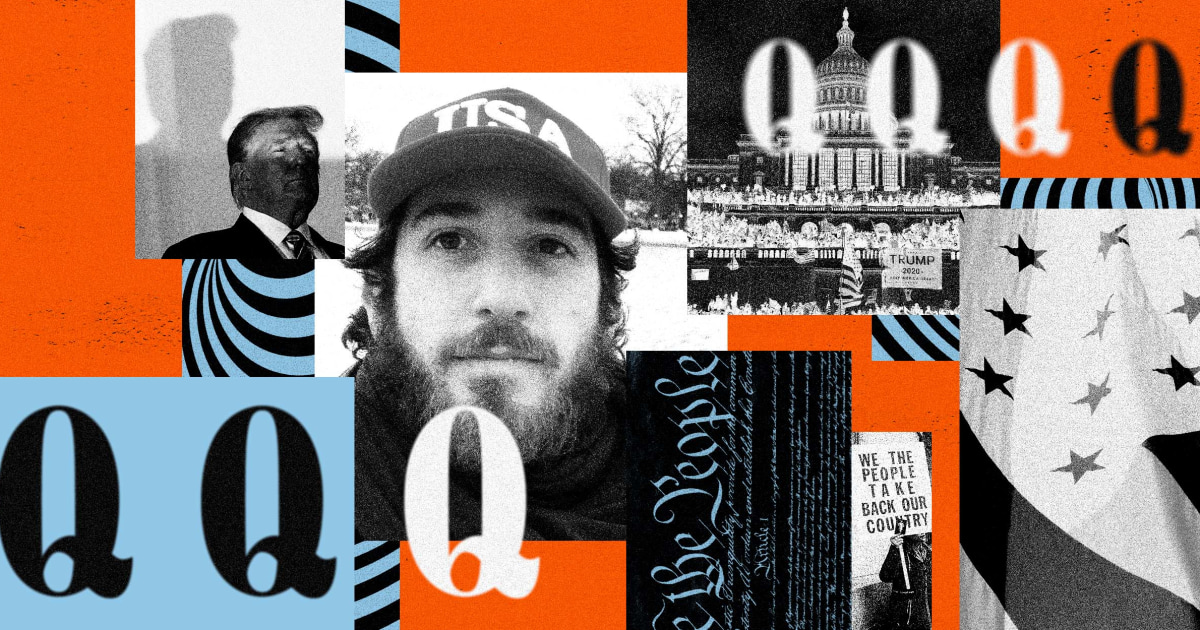Escape from QAnon: How Jan. 6 changed one person’s path

Without raised voices or judgment, they talked for hours. His parents wanted to know how Justin could have fallen so deeply into something so strange and consuming. If he was passionate about human trafficking, he had a big network and platform with his job. Certainly he could do actual work to fight for human rights? How could he throw his life away?
No amount of reasoning or fact-checking over the last year had made a dent in Justin’s stubborn allegiance to QAnon, and the obsession had taken an enormous emotional toll on the family. His parents had hardly slept in the last six months for worry, they told him. His dad was visibly depressed.
Justin’s younger brother, Corey, 26, had spent the night thinking about what he would say.
“It’s kind of hard as a little brother,” Corey, 26, recalled over Zoom. “How do you reach your older brother, who is supposed to be the older one, is supposed to have more wisdom?”
He thought a poem might break through and the words came easily. It started:
“I wish so deeply to compel
That you finally forego that weighted shell”
“I’ve always loved Justin, I’ve always looked up to Justin. I’ve always respected him,” Corey said. “And to see the path he went down these last three years, this rabbit hole, has been hard to watch. But I never lost faith in him.”
Over the next several days, Justin and Corey and their father went for walks. They asked Justin about QAnon and what had happened at the Capitol and just listened.
Corey remembers it as “chipping away at ice.” Eventually Justin broke down.
“It felt like I had been kidnapped,” Justin said of the moment. “Taken for a wild ride that was a lot of fun, and then dumped back on the street, trying to figure out, ‘Where did I just go, what just happened?’”
Back in Brooklyn, Justin tried to shake his habit. We kept in touch, through texts and phone calls and the occasional coffee. Justin was spending less time online, going for frigid walks through Central Park with the old friends he had traded in for QAnon months before, and trying to get a microgreens business off the ground.
But from time to time, Justin would wander over to the same online spaces he used to spend days on and he joined a few new QAnon Telegram channels, where the conspiracy theory community has thrived.
“It will take a little more time,” Justin told me in February over the phone. “It’s like getting over a relationship you’ve been in for three years, this total mind twist of a relationship.”
Justin’s break from QAnon didn’t come with a dismissal of all of the conspiracy theories that sit under QAnon’s umbrella. (He’s in company with others; half of Americans report believing in some conspiracy theory.)
He spent the next few months trying to figure things out, dissecting his beliefs and discarding those that he determined to be false. He no longer believed Hillary Clinton was running a child torture operation out of a pizza shop, but thought there could be sex trafficking rings in the nation’s capital. Covid was real, he decided, and he began wearing a mask in public, but he thought the pandemic was probably engineered, perhaps to affect global politics. John F. Kennedy Jr., though, was definitely dead.
What Justin did reject early on is the blanket distrust that QAnon engenders.
“I don’t believe that the world is part of one big conspiracy anymore,” Justin said. “One of the key tenets of the Q narrative was that the world is this evil place where everyone at the top is coordinating to bring the downfall of humanity. I no longer subscribe to that.”
A year after he stood at the Capitol steps, Justin has moved back into his parents’ home in Massachusetts. He doesn’t watch the news, stays off Twitter, is going to weekly therapy sessions and is trying to imagine his place in this new world. He’s interested in media literacy and thinks maybe his experience falling down the QAnon rabbit hole could somehow help others.
Justin and I talked on the phone again last week, on the anniversary of the Capitol riot. When pressed on his beliefs, Justin answered: “Do I still believe? It’s irrelevant. What I know is that I don’t want to dwell. Because what does that belief do? How does that help me become a better person, or friend, knowing that information?”
“I’ve realized how susceptible I am,” he said. “Now I’m just figuring out what’s next. Just taking a moment to breathe.”


